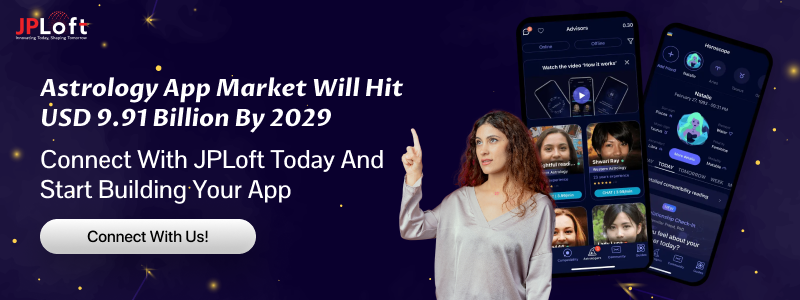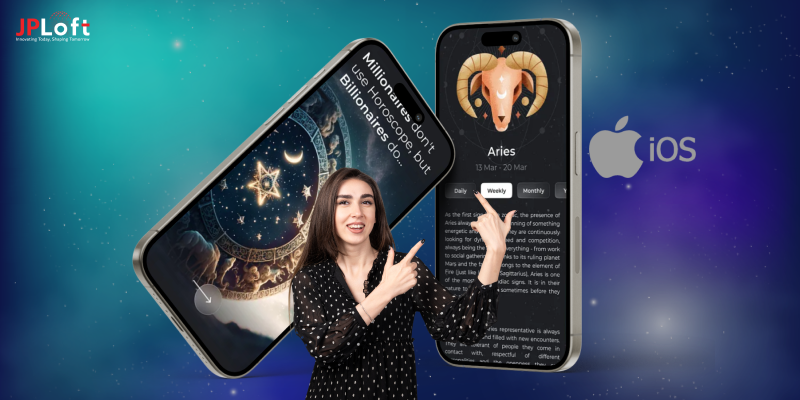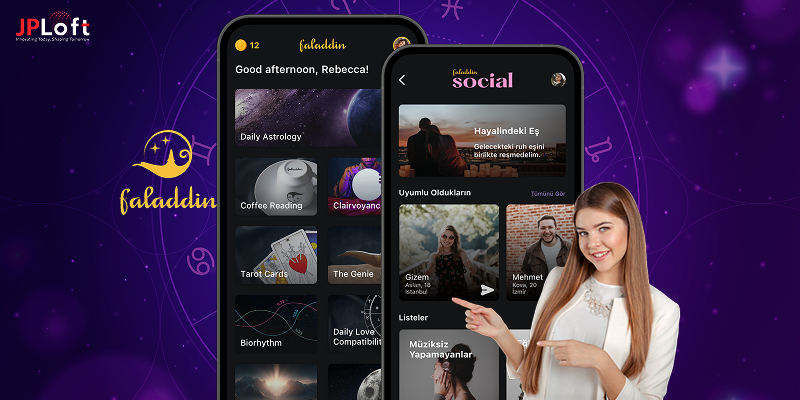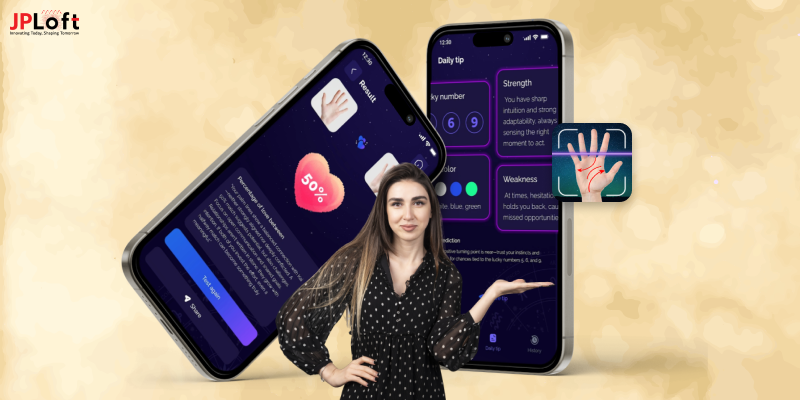Key Takeaways:
The global astrology app market is growing rapidly, projected to reach USD 9.91 billion by 2029, creating opportunities for new entrants.
Steps to develop an app like Nebula include research, astrology algorithms, AI integration, engaging UI/UX, monetization, and marketing.
Development costs vary widely from USD 20,000 for a basic MVP to USD 150,000+ for an advanced Nebula-like app with AI and live consultations.
App monetization streams include freemium subscriptions, in-app purchases, paid consultations, and e-commerce integrations.
AI enhances personalization, automates horoscope interpretations, and improves user retention through predictive analytics and chatbots.
Challenges include ensuring accuracy, scalability, trust, data security, and cultural sensitivity for a diverse global user base.
Partnering with an experienced app development company like JPLoft helps reduce risks, optimize costs, and deliver a secure, scalable, and engaging astrology platform.
Developing an astrology app like Nebula requires a blend of creativity, technology, and an understanding of astrology’s growing digital appeal. With millions of users turning to astrology apps for daily insights, horoscope readings, and personalized guidance, the demand for interactive and engaging platforms is higher than ever.
Nebula stands out due to its sleek design, personalized reports, and community-driven features, setting a benchmark for aspiring developers.
To understand how to develop a horoscope app like Nebula, one must focus on blending accurate astrological data with intuitive design and smooth user experience. Start by researching astrology systems, defining key features, designing an intuitive UI/UX, choosing the right tech stack, integrating astrology APIs, and thoroughly testing.
Beyond functionality, building trust through reliable data and an aesthetically pleasing interface is key to retaining users. In this blog, we will explore the essential steps, technologies, and strategies to develop an app like Nebula that not only attracts users but also fosters long-term engagement in a competitive app market.
All About Nebula App: Horoscope & Astrology
The Nebula app is a modern tool that brings personalized astrology and insightful readings right to the users’ fingertips. It provides users with insightful readings based on their zodiac signs, planetary positions, and astrological charts. Designed for users who want to deepen their understanding of themselves and the cosmos, Nebula provides daily, weekly, and monthly horoscopes, as well as other powerful astrological insights.
By combining simplicity with deep astrological guidance, Nebula appeals to beginners and enthusiasts alike, showing the effectiveness to build a horoscope app like Nebula. For those seeking deeper astrological insight, Nebula offers customized predictions for major life events, including career changes, financial growth, and health. With a user-friendly interface and a comprehensive set of features, Nebula stands out as a go-to platform for those seeking clarity in their spiritual, emotional, and life journey.
Nebula enhances user engagement through tarot readings, compatibility checks, mood tracking, and real-time astrological alerts. These features help users stay connected daily, making astrology a habit rather than a one-time activity. Its holistic approach, blending AI-driven personalization with professional guidance, highlights why astrology apps have become one of the fastest-growing categories in the wellness and lifestyle industry.
Whether you want to understand yourself better, improve your relationships, or gain clarity for the future, Nebula is your personal astrology companion. Now that we’ve explored what makes this app stand out in the world of astrology and horoscopes, let’s dive into the benefits to build a Nebula clone.
Reasons to Create an App like Nebula
Create an app like Nebula offers direct access to a rapidly expanding and lucrative astrology market, with high user engagement and multiple channels for monetization. By tapping into this trend, businesses can establish a strong foothold in a niche that combines spirituality, technology, and daily user engagement. The following points detail core reasons and supporting astrology market statistics for launching such a product:
1. Higher User Demand and Longevity
Millions worldwide routinely use astrology apps for daily horoscopes, compatibility checks, and life guidance, especially among Gen Z and millennials. According to a survey of US adults in April 2022, almost 80% of users fall between the ages 18-35, signaling brand longevity and relevance to younger audiences.
2. Recurring Revenue Model
Revenue streams include subscriptions, tarot readings, personalized reports, and live consultations, enabling consistent, scalable income and increased user retention through daily content. In research, it was found that the top 10 highest-earning astrology apps in the U.S. brought in an estimated $39.7 million in 2019, which includes Nebula.
3. Low Barriers to Entry
Development is now more accessible with pre-built APIs, ready-made astrology engines, and fast deployment across iOS and Android, allowing rapid MVP launches and wide reach with modest upfront investment. With millions of downloads worldwide, Nebula proves strong demand. This is attracting entrepreneurs to ways on how to build an app like Nebula that matches this success.
4. Competitive Advantage
Strategic partnerships with influencers and other wellness platforms drive downloads and brand growth, while AI and machine learning further improve prediction accuracy and user relevance. According to ResearchAndMarkets, the global astrology app market is projected to grow from $4.75 billion in 2025 to $9.91 billion in 2029, at a robust 20% CAGR.
5. Personalization and Technology Integration
AI-driven, hyper-personalized content (daily horoscopes, birth chart analysis, lunar calendars, wellness tracking), interactive features, and educational resources are key differentiators that deepen user engagement and loyalty. It helps increase user retention with evergreen engagement features.
6. Diverse Monetization Opportunities
Beyond subscriptions, revenue comes from ads, affiliate links (spiritual products, courses), and premium features like expert chats and compatibility reports, creating multiple income streams from a single platform.
Launching an app like Nebula, one of the best astrology apps in the US, targets a fast-growing audience, multiple monetization streams, and positions a product at the crossroads of spirituality, convenience, and technology.
Understanding the benefits to create a Nebula clone is just the beginning. To start an online astrology app business, it’s essential to know how such an app functions behind the scenes. Let’s take a closer look at how an app like Nebula actually works.
How does an App Like Nebula Work?
Popular astrology apps like Nebula combine ancient astrological practices with modern technology to deliver personalized insights. Here are the key steps involved in how a Nebula-like app works:
Step 1. User Onboarding and Profile Creation
When users first download the app, they create a profile by entering essential details such as name, gender, and preferences. Most importantly, they provide birth details, including date, time, and place of birth. This data forms the foundation for accurate astrological calculations.
Step 2. Data Processing and Chart Generation
Using the entered birth details, the app’s algorithms calculate the natal chart (birth chart). While you build an app like Nebula, integrate complex astronomical calculations like the positions of planets, houses, and zodiac signs at the exact time of birth. The app uses an internal database of celestial coordinates to ensure accuracy.
Step 3. Personalized Predictions and Reports
Once the birth chart is generated, the app applies astrological rules and interpretations to provide personalized readings. This may include daily/weekly/monthly horoscopes, personality analysis, compatibility reports, career and relationship guidance. These insights are delivered in simple, user-friendly language to engage users.
Step 4. AI-Powered Recommendations
AI analyzes user behavior (such as frequently visited features) to recommend tailored content like specific horoscopes, meditation tips, or consultations with astrologers. Many businesses that aim to make a horoscope app like Nebula integrate AI and machine learning to refine predictions.
Step 5. Interactive Features and Consultations
Nebula stands out by offering live consultations with professional astrologers, tarot readers, or psychics. Through in-app chat or calls, users can ask questions and receive real-time guidance. This interactive element boosts user trust and engagement.
Step 6. Content Delivery and Notifications
To keep users engaged, the app sends push notifications with daily horoscopes, astrological insights, or reminders for upcoming readings. Regular content updates ensure users return to the app daily.
An app like Nebula works by blending astrological science, AI-powered personalization, and engaging user experiences to provide accurate, accessible, and interactive astrology services. Backed by clear statistics and evolving demographic astrology app trends.
Now that you have a clear understanding of how an app like Nebula operates, the next step is to explore the key features that make it engaging and valuable to users. Let’s take a closer look at the must-have features to build a Nebula clone successfully.
Features to Include in an Astrology App like Nebula
When you develop a Nebula clone, it is essential to integrate a variety of features that offer users personalized insights, tools for self-reflection, and real-time astrological guidance. Below are the key astrology app features that would make it both comprehensive and engaging:
|
Components |
Features |
|
User Onboarding & Profile Setup |
|
|
Horoscope Generator |
|
|
Natal/Birth Chart Generation |
|
|
Compatibility Report |
|
|
Personalized Astrology Insight |
|
|
Live Consultations with an Expert |
|
|
Tarot & Numerology Services |
|
|
AI-Powered Recommendations |
|
|
Daily Reminders & Notifications |
|
|
Content Library |
|
|
Community & Social Features |
|
|
Premium Membership & Monetization |
|
|
Analytics & Feedback System |
|
By combining these features while you make a Nebula Clone, it will offer users an immersive and personalized experience that aligns with their spiritual needs, relationship dynamics, and life goals.
After identifying the essential features that make an astrology app engaging and user-friendly, the next step is understanding how to bring them to life. Let’s explore the step-by-step process of how to develop a horoscope app like Nebula and build the next most successful app.
How to Develop a Horoscope App like Nebula?
To make a horoscope app like Nebula, it requires the perfect blend of astrology expertise, modern technology, and engaging design. Let's explore the step-by-step process of astrology app development, like Nebula:
Step 1. Research the Market and Define Your Niche
Start to develop a Nebula clone with market research to identify opportunities:
-
Target audience: Are you catering to Gen Z seeking love advice or millennials interested in self-growth?
-
Unique value: Will your app focus on daily horoscopes, Vedic astrology, tarot, or live sessions?
-
Competitor gaps: Nebula has been criticized for aggressive upselling. An area you can improve.
Defining your niche helps differentiate your app in a crowded market.
Step 2. Plan Features and Functionality
Your feature set determines the user experience. Essential ones include:
-
Profile setup with birth details
-
Daily, weekly, and monthly horoscopes
-
Birth/natal chart generation
-
Compatibility reports
-
Tarot and numerology readings
-
Live astrologer consultations (chat, voice, video)
-
Push notifications for daily updates
-
Premium subscriptions and in-app purchases
When beginning with how to develop an app like Nebula, it’s best to start with a Minimum Viable Product (MVP) and later scale with advanced tools like palmistry AI or gamified zodiac quizzes.
Step 3. Choose the Right Tech Stack
The technology behind your app will determine its performance and scalability. To create a Nebula clone, you’ll need the following astrology app tech stack:
-
Frontend: Swift (iOS), Kotlin (Android), or React Native/Flutter for cross-platform apps.
-
Backend: Node.js, Python, or Ruby on Rails for handling user data and API requests.
-
Database: PostgreSQL or MongoDB to store user data and birth details.
-
APIs & Libraries: Astrology APIs (for ephemeris and planetary positions), AI/ML frameworks like TensorFlow or PyTorch for predictions.
-
Cloud Hosting: AWS, Google Cloud, or Azure for scalability and mobile app security.
Ensure the app supports real-time consultations, which may require WebRTC integration for video calls.
Step 4. Astrology Data and Algorithm Development
The backbone of your app lies in its ability to generate accurate astrological readings and plays an important role in Nebula-like app development. You’ll need to:
-
Integrate a reliable ephemeris (astronomical database) to track planetary positions.
-
Build or license astrological algorithms to calculate birth charts, moon phases, and planetary transits.
-
Customize algorithms for different traditions like Western, Vedic, or Chinese astrology, depending on your audience.
Accuracy is key. Inaccurate readings can erode user trust, so this step must be precise.
Step 5. Integrate AI for Personalization
One of the reasons apps like Nebula succeed is their AI-powered personalization. You can use AI to:
-
Deliver customized horoscope content based on user preferences.
-
Use NLP (Natural Language Processing) to convert complex astrological terms into simple, conversational readings.
-
Provide AI chatbots for instant mini-readings or FAQ support.
-
Match users with the most suitable astrologers for consultations.
AI makes the app feel more like a personal life coach than just a horoscope generator.
Step 6. Design an Engaging User Experience (UI/UX)
Astrology apps thrive on visual appeal. Your astrology app design should:
-
Be intuitive and calming, with zodiac-inspired colors and symbols.
-
Include interactive charts instead of plain text-heavy predictions.
-
Smooth navigation to keep users engaged.
-
Use animations and gamification in astrology app (like daily zodiac quizzes).
A good design to make a horoscope app like Nebula creates a sense of mystique while remaining easy to use.
Step 7. Add Live Consultation Features
Modern astrology apps provide horoscopes along with spiritual guidance by experts. Adding a consultation marketplace while you build an app like Nebula gives additional revenue-generating opportunities.
-
Allow astrologers to sign up and provide services.
-
Enable real-time chat, voice, and video sessions.
-
Set up a payment gateway for per-minute or per-session billing.
This transforms your app into a full-fledged astrology marketplace and boosts revenue, along with credibility and trust.
Step 8. Monetization Strategies
Balancing free and paid features is key to user retention. To make your horoscope app profitable, consider these mobile app monetization models:
-
Freemium subscriptions
-
In-app purchases
-
Paid consultations
-
E-commerce store
-
Ads and partnerships
A balanced approach while you create a horoscope app like Nebula prevents overaggressive monetization, which often drives users away.
Step 9. Ensure Data Privacy and Compliance
Users provide sensitive personal details like birth data and relationship queries. Protect them with:
-
End-to-end encryption for chats
-
GDPR and CCPA compliance
-
A transparent privacy policy
Trust is an important feature if you build an app like Nebula and have to deal with personal insights.
Step 10. Test and Launch the App
Thorough astrology app testing ensures smooth performance:
-
Functional testing for astrology calculations and features.
-
Load testing to handle thousands of simultaneous users.
-
Usability testing for UI/UX flow.
-
Astrology app security testing to prevent data leaks.
After testing, launch your app with a soft rollout (beta version) to gather user feedback before a global release.
Step 11. Marketing and User Acquisition
A horoscope app thrives on daily engagement. To attract and retain users:
-
Use App Store Optimization (ASO) with keywords like “daily horoscope” and “zodiac compatibility.”
-
Run social media campaigns on Instagram, TikTok, and YouTube, where astrology is trending.
-
Collaborate with influencers and astrologers for authentic endorsements.
Offer free trials or referral bonuses to encourage downloads.
From accurate birth chart algorithms to AI-driven personalization and live consultations, every step of how to build an app like Nebula should enhance the user journey. While building an astrology app like Nebula involves careful planning, feature integration, and design, the real breakthrough lies in leveraging AI.
Mastering how to develop an app like Nebula ensures your product can evolve into a trusted spiritual companion for millions worldwide. Let’s now explore how AI can help you build a horoscope app like Nebula by enhancing personalization, engagement, and overall user experience in horoscope app development.
Use of AI in Creating an App like Nebula
AI in astrology apps is a game-changer, transforming them from simple horoscope generators into personalized, interactive, and adaptive platforms. While you build a horoscope app like Nebula, AI can play a vital role in multiple stages:
A] Personalized Horoscope Generation
-
AI can process vast amounts of astronomical data and map it to each user’s birth details.
-
Instead of generic horoscopes, machine learning models analyze user preferences, patterns, and past interactions to deliver tailored predictions.
B] Natural Language Processing (NLP) for Readings
-
Integration of AI-powered NLP models while you create an app like Nebula can help generate human-like, easy-to-understand interpretations of complex astrological calculations.
-
It ensures reports don’t feel too technical, making astrology accessible to everyone.
C] AI Chatbots for Instant Consultations
-
Instead of waiting for a live astrologer, users can interact with AI chatbots trained on astrological knowledge. Reduces dependency on human astrologers while keeping users engaged 24/7.
-
These chatbots can answer FAQs, provide mini-readings, and guide users through features.
D] Predictive Analytics for User Engagement
-
Building an AI app that analyzes user behavior (login times, frequently used features, favorite zodiac topics) to predict future needs.
-
Push notifications and personalized content recommendations keep users hooked.
E] Expert Matching and Consultation Optimization
-
AI algorithms can match users with the most suitable astrologers or tarot readers based on personality type, query, and past interactions.
-
Improves user satisfaction by ensuring relevant and accurate consultations.
F] Voice and Image Recognition Features
-
AI-driven voice assistants can read daily horoscopes aloud or answer spoken questions.
-
Image recognition could allow palmistry integration, where users upload hand images for instant palm readings.
G] Continuous Learning and Improvement
-
Machine learning models improve predictions by learning from user feedback and historical accuracy.
-
Over time, the app becomes smarter, offering more relevant and precise readings.
AI transforms how to build an app like Nebula into a personal life guide. It's not just predictive but also understands, adapts, and imagines with the user in real time. It blends traditional astrology with modern technology, making the experience more accurate, personalized, and interactive. Partner with an AI app development company to integrate AI into your astrology app seamlessly.
While AI plays a crucial role in making an astrology app like Nebula more personalized and engaging, it also adds to the overall development complexity. This raises the question of how much Nebula-like app development cost with such advanced features.
How Much Does it Cost to Build an App like Nebula?
The cost to develop an app like Nebula ranges widely from USD 20,000 for a basic astrology app to USD 150,000+ for an enterprise-grade platform. Astrology app development cost depends on factors such as features, platform, design complexity, and development team location.
Below is an estimated breakdown of Nebula-like app development cost:
|
Feature/Module |
Description |
Estimated Cost (in USD) |
|
User Onboarding & Profile Setup |
|
$5,000 – $8,000 |
|
Horoscope Generator |
|
$8,000 – $12,000 |
|
Natal Chart & Compatibility System |
|
$12,000 – $18,000 |
|
Tarot & Numerology Module |
|
$10,000 – $15,000 |
|
AI & Personalization Features |
|
$15,000 – $25,000 |
|
Live Consultation Module |
|
$20,000 – $35,000 |
|
UI/UX Design |
|
$8,000 – $20,000 |
|
Backend Development & Infrastructure |
|
$15,000 – $25,000 |
|
E-Commerce Integration |
|
$10,000 – $15,000 |
|
Admin Dashboard |
|
$7,000 – $12,000 |
|
Mobile app testing & QA |
|
$5,000 – $10,000 |
Ongoing Costs of the Mangomint-Like App:
-
App store publishing & marketing: USD 5,000 – USD 15,000
-
Ongoing mobile app maintenance & updates: 15–20% of development cost annually
-
Customer support & astrologer partnerships: Variable
Estimated Development Cost based on App Complexity
1. Basic Astrology App:
-
Features: Daily horoscopes, profiles, notifications
-
Estimated Cost in USD: $20,000 – $40,000
2. Mid-Level App:
-
Features: Birth charts, compatibility, tarot, subscriptions
-
Estimated Cost in USD: $50,000 – $90,000
3. Advanced App (like Nebula):
-
Features: AI, live astrologer sessions, video calls, e-commerce, premium subscriptions
-
Estimated Cost in USD: $120,000 – $150,000+
The growing demand for astrology apps makes it a good investment to develop an app like Nebula. Depending on the features you choose, the cost varies between USD 20,000 to USD 150,000+. Partnering with an experienced mobile app development company in the UK and starting small, then scaling with user demand, is the smartest way to manage costs while entering this growing market.
Understanding the cost to develop an app like Nebula gives you clarity on investment, but the next big question is how to ensure profitability. Let’s explore the most effective money-making strategies for an app like Nebula.
Money-Making Strategies to Create an App like Nebula
If you create a horoscope app like Nebula, it presents several monetization opportunities. Whether you want to build a free app with in-app purchases or a premium subscription-based service, there are multiple money-making strategies you can implement.
Here are some effective astrology app monetization approaches:
1] Freemium Model
The freemium model is one of the most common ways to monetize an app like Nebula. Users can download the app for free, access basic features, and then upgrade for premium functionality.
How It Works:
Basic astrology features like daily horoscopes are free. Paid version will get advanced features like birth chart analysis, compatibility reports, personalized predictions, tarot readings, or access to live astrologers.
2] Subscription-Based Model
A subscription-based approach offers consistent revenue, allowing you to provide ongoing, high-quality content and personalized services. This is a great way to build long-term engagement and trust with users when you make a Nebula clone.
How It Works:
Recurring revenue from monthly or annual subscriptions after the free trial period. Offering discounted rates for long-term subscriptions can increase user retention.
3] Selling Customized Astrology Reports
Astrology apps like Nebula can create and sell highly customized astrology reports based on user data. These reports cover a wide range of topics, such as life purpose, love compatibility, career paths, etc.
How It Works:
Revenue from selling customized reports. Bundle reports into specialized packages for users to get a comprehensive view of their astrology.
4] Live Consultations (Pay Per Session)
Offering live consultations with professional astrologers can be a lucrative feature for an astrology app like Nebula. Many users will be willing to pay for one-on-one guidance and personalized readings.
How It Works:
A cut from each live session booked, either as a flat fee or a percentage of the astrologer’s fee. Optional subscription packages for regular consultations (e.g., monthly check-ins).
5] Merchandising and Physical Products
You can expand your app’s offerings by selling astrology-themed products such as personalized jewelry, zodiac-themed clothing, crystal sets, and other spiritual tools.
How It Works:
Profit from the sale of physical products through the app. Create an app like Nebula, with e-commerce integration for easy in-app purchases.
A successful astrology app like Nebula thrives by combining recurring revenue models with transaction-based income like consultations and e-commerce. Diversifying income streams ensures both high profitability and long-term sustainability of the astrology app.
After understanding how an app like Nebula can generate revenue, it’s equally important to consider the obstacles. Let’s dive into the key challenges developers face during the process.
Challenges to Make an App like Nebula
Successful Nebula-like app development involves more than just coding and content creation. It requires overcoming technical, business, user experience, and astrology app development challenges. Below are the key challenges you might face during the development and growth of such an app:
► Accurate Astrological Calculations
Astrology relies on precise planetary data and birth chart calculations. Mistakes in interpreting planetary positions or aspects can lead to inaccurate readings, which quickly reduces user trust.
Solution: Use reliable astrology libraries and consult with professional astrologers during development.
► Personalized Content at Scale
Offering highly personalized horoscopes and forecasts for every user is difficult, especially as the user base grows. Balancing automation with a human-like, intuitive tone is complex.
Solution: Use AI and Natural Language Generation (NLG) to automate personalized content creation while maintaining a natural voice.
► Integrating AI and Machine Learning
Implementing AI to provide mood tracking, emotional forecasting, or behavior-based recommendations is technically advanced and requires continuous data refinement.
Solution: Start with simple models and evolve based on collected user data and feedback. AI models should be regularly trained with data and user behavior insights.
► User Experience (UX) and Interface Design
Astrology apps must present complex information (charts, transits, aspects) in a way that’s visually appealing and easy to understand, even for beginners. A cluttered or confusing UI can alienate users.
Solution: Make a mobile app design with a clean, intuitive interface with customization options for different experience levels.
► Data Privacy and Consent
Astrology apps require sensitive personal data like birth date, time, and location. Improper handling can lead to trust and legal issues. Companies need clear consent processes and secure data storage.
Solution: Implement strong encryption, anonymization, and transparent privacy policies. Must comply with data protection laws like GDPR, CCPA, etc.
Building an astrology app like Nebula is both creatively and technically demanding. Overcoming these challenges is key to creating a credible, engaging, and monetizable astrology app that grabs the users’ attention.
Connect with JPLoft and Build your App like Nebula
Are you inspired by the success of astrology apps like Nebula and ready to launch your own?
At JPLoft , we specialize in building high-performing, feature-rich mobile apps that blend ancient astrology practices with modern technology. Our expert team of developers, designers, and AI specialists ensures your app looks stunning and delivers personalized, accurate, and engaging experiences for users worldwide.
Whether you’re looking to create a basic MVP or a full-scale premium platform, we provide end-to-end services. With years of experience in app development, UI/UX design, and scalable backend solutions, JPLoft, a highly experienced astrology app development company, helps you reduce costs, speed up time-to-market, and ensure a secure, reliable app that your users will trust.
Don’t just think about building the next game-changing astrology app. Make it a reality with JPLoft! Contact us today and start your journey toward creating an app like Nebula.
Conclusion
Astrology apps like Nebula have transformed the way people connect with horoscopes and spiritual guidance, proving there’s a growing global demand for personalized insights. To develop an app like Nebula requires a deep understanding of astrology, smart use of technology like AI and machine learning, excellent UX design, and careful attention to data privacy and trust.
From accurate horoscope algorithms and AI-driven personalization to live consultations and secure user experiences, every feature plays a role in creating trust and engagement. While the development process involves challenges such as cost, scalability, and data security, the rewards are significant.
With strategic monetization models like subscriptions, in-app purchases, and consultations, your app can become both profitable and impactful. If you are planning to step into this industry and be a part of this newly trendy sector, now is the right time to start with how to develop an app like Nebula.
FAQs
To develop a horoscope app like Nebula, focus on accurate astrological data, engaging features like daily forecasts and compatibility checks, intuitive UI/UX design, and secure technology integration. Add live consultations, personalization options, and interactive elements to ensure user trust and retention.
Developing an astrology app costs USD 40,000 to USD $150,000+, depending on features, platforms, design complexity, AI integration, and development location. Starting with an MVP reduces initial investment.
Key features include horoscopes, natal charts, compatibility checks, AI personalization, tarot readings, live consultations, push notifications, premium subscriptions, and an admin dashboard for managing astrologers and users effectively.
On average, it takes 4–9 months to develop an astrology app, including planning, design, backend development, integration of astrology APIs, testing, and launch. The timeline varies by the complexity of the app and its features.
AI improves personalization, generates natural horoscope interpretations, powers chatbots for instant readings, and matches users with suitable astrologers, making the app smarter, more interactive, and engaging for users.












Share this blog